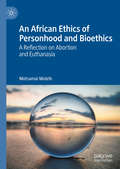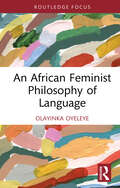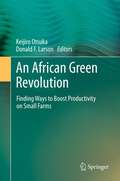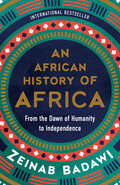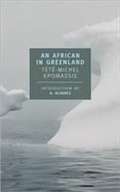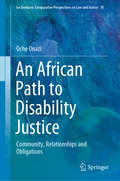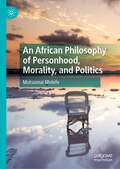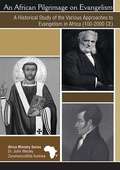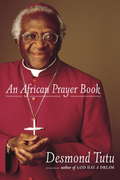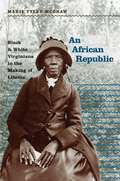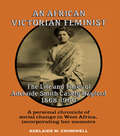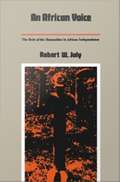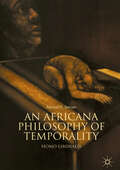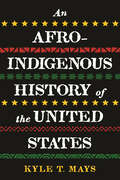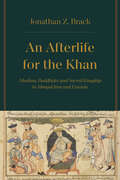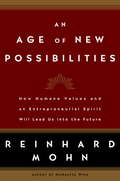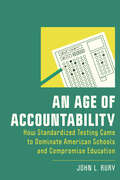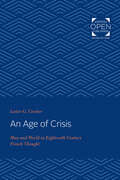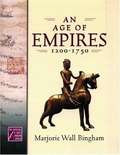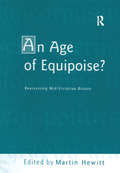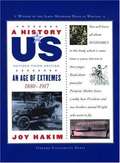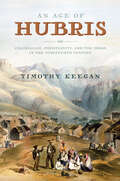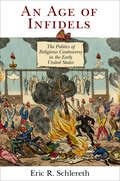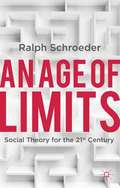- Table View
- List View
An African Ethics of Personhood and Bioethics: A Reflection on Abortion and Euthanasia
by Motsamai MolefeThis book articulates an African conception of dignity in light of the salient axiological category of personhood in African cultures. The idea of personhood embodies a moral system for evaluating human lives exuding with virtue or ones that are morally excellent. This book argues that this idea of personhood embodies an under-explored conception of dignity, which accounts for it in terms of our capacity for the virtue of sympathy. It then proceeds to apply this personhood-based conception of dignity to bioethical questions, specifically, those of abortion and euthanasia. Regarding abortion, it concludes that it is impermissible since foetuses possess partial moral status. Regarding euthanasia, it argues that it is permissible for reasons revolving around avoiding the reversing of personhood. It also, though, minimally, touches on the questions regarding the mentally disabled and animals, to which it assigns lower moral status.
An African Feminist Philosophy of Language (ISSN)
by Olayinka OyeleyeThis book calls for the institution of an African feminist philosophy of language, challenging existing debates and encouraging a move away from the Western gaze.The book begins with an analysis of the philosophical context of African feminism, and a call for the decolonization of epistemological discourse. Oyeleye then goes on to consider how indigenous patriarchies play out in the cultural reality of the Yorùbá in particular, ontologically unpacking the nature of woman as expressed in language, especially in myths and proverbs. Challenging the derogatory language found in proverbs which entrench patriarchal oppression, the author advocates for feminist postproverbials: new proverbs which draw on old traditions but reconstruct the space of woman in a new, egalitarian rhetorical tradition. The author concludes by outlining the conditions necessary for African feminist philosophers to consider language as a decolonizing space which can help to push through the agenda of social change.This book will be an important resource for researchers from across the fields of gender and women studies, feminist philosophy, philosophy of language, cultural studies, and African studies.
An African Green Revolution: Finding Ways to Boost Productivity on Small Farms (Natural Resource Management and Policy #48)
by Keijiro Otsuka Donald F. LarsonThis volume explores the usefulness of the Asian model of agricultural development for Africa, where, even before the recent world food crisis, half the population lived on less than on dollar a day, and a staggering one in three people and one third of all children were undernourished. Africa has abundant natural resources; agriculture provides most of its jobs, a third of national income and a larger portion of total export earnings. However the levels of land and labor productivity rank among the worst in the world. The book explains Africa's productivity gap and proposes ways to close it, by examining recent experience in Africa and by drawing on lessons from Asia.
An African History of Africa: From the Dawn of Humanity to Independence
by Zeinab BadawiAlready a major international bestseller, Zeinab Badawi’s sweeping and much-needed survey of African history traces the continent’s extraordinary legacy from prehistory to the present from the African perspective.“Equal parts gripping and galvanizing. . . . Researched across more than 30 countries, it brings the dazzling civilizations of pre-colonial Africa vividly to life. A book that feels both long-overdue—and wholly worth the wait.” —British VogueEveryone is originally from Africa, and this book is therefore for everyone.For too long, Africa’s history has been dominated by western narratives of slavery and colonialism, or simply ignored. Now, Zeinab Badawi sets the record straight.In this fascinating book, Badawi guides us through Africa’s spectacular history—from the very origins of our species, through ancient civilizations and medieval empires with remarkable queens and kings, to the miseries of conquest and the elation of independence. Visiting more than thirty African countries to interview countless historians, anthropologists, archaeologists and local storytellers, she unearths buried histories from across the continent and gives Africa its rightful place in our global story.The result is a gripping new account of Africa: an epic, sweeping history of the oldest inhabited continent on the planet, told through the voices of Africans themselves.
An African In Greenland
by James Kirkup Tété-Michel Kpomassie A. AlvarezTété-Michel Kpomassie was a teenager in Togo when he discovered a book about Greenland—and knew that he must go there. Working his way north over nearly a decade, Kpomassie finally arrived in the country of his dreams. This brilliantly observed and superbly entertaining record of his adventures among the Inuit is a testament both to the wonderful strangeness of the human species and to the surprising sympathies that bind us all.
An African Path to Disability Justice: Community, Relationships and Obligations (Ius Gentium: Comparative Perspectives on Law and Justice #78)
by Oche OnaziHow should disability justice be conceptualised, not by orthodox human rights or capabilities approaches, but by a legal philosophy that mirrors an African relational community ideal? This book develops the first comprehensive answer to this question through the contemporary literature on African philosophy, which is relied upon to construct a legal philosophy of disability justice comprising of ethical ideals of community, human relationships and obligations. From these ideals, an African legal philosophy of disability justice is offered as a criterion for critically evaluating existing laws, legal and political institutions, as well as providing an ethical basis for creating new ones to ensure that they are inclusive to people with disabilities. In taking an alternative perspective on the subject, the book outlines and emphasises the need for a new public culture of obligations owed to people with disabilities, highlighting both the prospects and difficulties of achieving the ideal of disability justice that continues to elude the lived experiences of millions of Africans today. Oche Onazi's An African Path to Disability Justice is the first book-length exploration of disability in the light of African ethics, as contrasted with the human rights and capabilities frameworks. Of particular interest are Onazi's thoughtful reflections on how various conceptions of community salient in African moral philosophy––including group-based, reciprocal and relational––bear on what we owe to the disabled. --Thaddeus Metz, Distinguished Professor, University of Johannesburg
An African Philosophy of Personhood, Morality, and Politics
by Motsamai MolefeThis book explores the salient ethical idea of personhood in African philosophy. It is a philosophical exposition that pursues the ethical and political consequences of the normative idea of personhood as a robust or even foundational ethical category. Personhood refers to the moral achievements of the moral agent usually captured in terms of a virtuous character, which have consequences for both morality and politics. The aim is not to argue for the plausibility of the ethical and political consequences of the idea of personhood. Rather, the book showcases some of the moral-political content and consequences of the account it presents.
An African Pilgrimage on Evangelism
by John KurewaHow easily we forget that it was Africans who brought the gospel to Africa, not foreign missionaries! Evangelism has always been central to African Christianity, ever since Egyptians and Libyans returned home from Jerusalem following the day of Pentecost (Acts 2). In this brief history of the church in Africa, Dr. John Kurewa highlights the major approaches to evangelism that the church employed over the centuries, for better and for worse. Then, in historical context, Kurewa zeroes in on those distinctive methods of evangelism, proclamation and disciple formation that shaped a diverse yet vibrant African Methodism. Thanks to this historical review, we stand to gain fresh vision for ministries of evangelism that truly can fulfill the Great Commission--to make disciples of Jesus Christ.
An African Prayer Book
by Desmond TutuThe great Archbishop of Capetown, South Africa, shares with us the simple but profound secrets of his extraordinary spiritual strength by unveiling his very own book of prayer. Prayer, our conversation with God, needs no set formulas or flowery phrases. It often needs no words at all. But for most believers, the words of others can be a wonderful aid to devotion, especially when these words come front faithful fellow pilgrims. The African Prayer Bookis just such an aid, for in this collection all the spiritual riches of the vast and varied continent of Africa are bravely set forth. Here we may delight in Solomon's splendid encounter with the Queen of Sheba, overhear the simple prayer of a penniless Bushman, and glory in the sensuous sonorities of the mysterious liturgies of the Egyptian Copts. Here are Jesus' own encounters with Africa, which provided him refuge at the beginning of his life (from the murderous King Herod) and aid at its end (in the person of Simon of Cyrene, who helped Jesus carry his cross). Here are the prayers of some of the greatest among the mothers and fathers of the Church -- Monica, Augustine, Clement of Alexandria, Cyprian of Carthag -- as well as the prayers from the African diasporas of North America and the Caribbean. From thunderous multi-invocation litanies to quiet meditations, here are prayers that every heart can speak with strength and confidence. Archbishop Desmond Tutu, who is for millions the very soul of Africa, is our guide on this unique spiritual journey. His introduction is destined to become a classic, his characteristic energy and optimism light our way, and the words of his favorite prayers (many composed by the Archbishop himself) will stay with us forever.
An African Republic
by Marie Tyler-McgrawThe nineteenth-century American Colonization Society (ACS) project of persuading all American free blacks to emigrate to the ACS colony of Liberia could never be accomplished. Few free blacks volunteered, and greater numbers would have overwhelmed the meager resources of the ACS. Given that reality, who supported African colonization and why? No state was more involved with the project than Virginia, where white Virginians provided much of the political and organizational leadership and black Virginians provided a majority of the emigrants.In An African Republic, Marie Tyler-McGraw traces the parallel but seldom intersecting tracks of black and white Virginians' interests in African colonization, from revolutionary-era efforts at emancipation legislation to African American churches' concern for African missions. In Virginia, African colonization attracted aging revolutionaries, republican mothers and their daughters, bondpersons schooled and emancipated for Liberia, evangelical planters and merchants, urban free blacks, opportunistic politicians, Quakers, and gentlemen novelists. An African Republic follows the experiences of the emigrants from Virginia to Liberia, where some became the leadership class, consciously seeking to demonstrate black abilities, while others found greater hardship and early death. Tyler-McGraw carefully examines the tensions between racial identities, domestic visions, and republican citizenship in Virginia and Liberia.
An African Slaving Port and the Atlantic World: Benguela and Its Hinterland
by Mariana P. CandidoThis book traces the history and development of the port of Benguela, the third largest port of slave embarkation on the coast of Africa, from the early seventeenth to the mid-nineteenth century. Benguela, located on the central coast of present-day Angola, was founded by the Portuguese in the early seventeenth century. In discussing the impact of the trans-Atlantic slave trade on African societies, Mariana P. Candido explores the formation of new elites, the collapse of old states, and the emergence of new states. Placing Benguela in an Atlantic perspective, this study shows how events in the Caribbean and Brazil affected social and political changes on the African coast. This book emphasizes the importance of the South Atlantic as a space for the circulation of people, ideas, and crops.
An African Victorian Feminist: The Life and Times of Adelaide Smith Casely Hayford 1848-1960
by Adelaide M CromwellFirst published in 2004. Routledge is an imprint of Taylor & Francis, an informa company.
An African Voice: The Role of the Humanities in African Independence
by Robert W. JulyThrough the work of leading African writers, artists, musicians and educators-from Nobel prizewinner Wole Soyinka to names hardly known outside their native lands-An African Voice describes the contributions of the humanities to the achievement of independence for the peoples of black Africa following the Second World War. While concentrating on cultural independence, these leading humanists also demonstrate the intimate connection between cultural freedom and genuine political economic liberty.
An Africana Philosophy of Temporality: Homo Liminalis
by Michael E. SawyerThis book is a timely intervention in the areas of philosophy, history, and literature. As an exploration of the modern political order and its racial genealogy, it emerges at a moment when scholars and activists alike are wrestling with how to understand subject formation from the perspective of the subordinated rather than from dominant social and philosophical modes of thought. For Sawyer, studying the formation of racialized subjects requires a new imagining of marginalized subjects. Black subjectivity is not viewed from the static imaginings of social death, alienation, ongoing abjection, or as a confrontation with the treat of oblivion. Sawyer innovates the term "fractured temporality," conceptualizing Black subjects as moving within and across temporalities in transition, incorporated, yet excluded, marked with the social death of Atlantic slavery and the emergent political orders it etched, and still capable of exerting revolutionary force that acts upon, against, and through racial oppression.
An Afro-Indigenous History of the United States
by Kyle T. MaysThe first intersectional history of the Black and Native American struggle for freedom in our country that also reframes our understanding of who was Indigenous in early AmericaBeginning with pre-Revolutionary America and moving into the movement for Black lives and contemporary Indigenous activism, Afro-Indigenous historian, Kyle T. Mays argues that the foundations of the US are rooted in antiblackness and settler colonialism, and that these parallel oppressions continue into the present. He explores how Black and Indigenous peoples have always resisted and struggled for freedom, sometimes together, and sometimes apart. Whether to end African enslavement and Indigenous removal or eradicate capitalism and colonialism, Mays show how the fervor of Black and Indigenous peoples calls for justice have consistently sought to uproot white supremacy.Mays uses a wide-array of historical activists and pop culture icons, &“sacred&” texts, and foundational texts like the Declaration of Independence and Democracy in America. He covers the civil rights movement and freedom struggles of the 1960s and 1970s, and explores current debates around the use of Native American imagery and the cultural appropriation of Black culture. Mays compels us to rethink both our history as well as contemporary debates and to imagine the powerful possibilities of Afro-Indigenous solidarity.
An Afterlife for the Khan: Muslims, Buddhists, and Sacred Kingship in Mongol Iran and Eurasia
by Dr. Jonathan Z. BrackIn the Mongol Empire, the interfaith court provided a contested arena for a performance of the Mongol ruler’s sacred kingship, and the debate was fiercely ideological and religious. At the court of the newly established Ilkhanate, Muslim administrators, Buddhist monks, and Christian clergy all attempted to sway their imperial overlords, arguing fiercely over the proper role of the king and his government, with momentous and far-reaching consequences. Focusing on the famous but understudied figure of the grand vizier Rashid al-Din, a Persian Jew who converted to Islam, Jonathan Z. Brack explores the myriad ways Rashid al-Din and his fellow courtiers investigated, reformulated, and transformed long-standing ideas of authority and power. Out of this intellectual ferment of accommodation, resistance, and experimentation, they developed a completely new understanding of sacred kingship. This new ideal, and the political theology it subtends, would go on to become a central justification in imperial projects across Eurasia in the centuries that followed. An Afterlife for the Khan offers a powerful cultural and intellectual history of this pivotal moment for Islam and empire in the Middle East and Asia.
An Age Of New Possibilities
by Reinhard MohnWe live in an exciting and rapidly changing time—every day it seems new inventions and innovations that change our way of life arrive on the scene. But while our day-to-day lives have become easier, the larger picture is now more complicated. Businesses are also faced with this quandary. Change is occurring in the economic sphere as quickly and often as it is in our individual lives, and the new global economy is presenting even more challenges to companies that must operate in an often unfamiliar worldwide arena. As a result, the modern business world is in dire need of a complete overhaul if companies are to adapt to an environment that is far different from the one in which they initially achieved success. Enter Reinhard Mohn, the innovative entrepreneur who built Bertelsmann into a global powerhouse. Drawing on his more than fifty years of experience in the private sector, Mohn explains how entrepreneurial leaders have a unique ability to lead businesses into the future by adapting to new socioeconomic realities. He shows how private businesses have become increasingly connected to both politics and the public sector, making the need for constant change necessary to the survival and success of all companies. Furthermore, Mohn demonstrates why, in order to thrive in the future, businesses—as well as governmental and social organizations—must abandon the obsolete practices they have long relied on, creating instead new ways of doing business to adapt to our ever more mutable world. With a career’s worth of knowledge gained by guiding Bertelsmann to become one of the foremost media companies in the world, Mohn offers invaluable insights in An Age of New Possibilities, making this an essential read for anyone with a taste for the incredible challenge of doing business in the twenty-first century.
An Age of Accountability: How Standardized Testing Came to Dominate American Schools and Compromise Education (New Directions in the History of Education)
by John L. RuryAn Age of Accountability highlights the role of test-based accountability as a policy framework in American education from 1970 to 2020. For more than half a century, the quest to hold schools and educators accountable for academic achievement has relied almost exclusively on standardized assessment. The theory of change embedded in almost all test-based accountability programs held that assessment with stipulated consequences could lead to major improvements in schools. This was accomplished politically by proclaiming lofty goals of attaining universal proficiency and closing achievement gaps, which repeatedly failed to materialize. But even after very clear disappointments, no other policy framework has emerged to challenge its hegemony. The American public today has little confidence in institutions to improve the quality of goods and services they provide, especially in the public sector. As a consequence, many Americans continue to believe that accountability remains a vital necessity, even if educators and policy scholars disagree.
An Age of Crisis: Man and World in Eighteenth Century French Thought (Goucher Colloquium)
by Lester G. CrockerOriginally published in 1959. This book examines the French Enlightenment by analyzing critical thought in eighteenth-centruy France. It examines the philosophes' views on evil, free will and determinism, and human nature. This is an interesting group to look at, according to Crocker, because French Enlightenment thinkers straddled two vastly different time periods.
An Age of Empires, 1200-1750 (The Medieval and Early Modern World #4)
by Marjorie Wall BinghamThe Age of Empires includes some of the most colorful, ruthless, and restless figures in all of history. During this time Genghis Khan told his troops to "fall upon the enemy like falcons," Ivan the Terrible expelled Mongol invaders from Russia but murdered his own son in a fit of rage, and Babur the Tiger ruled India, combining ferocity on the battlefield with a love of books and poetry.
An Age of Equipoise? Reassessing mid-Victorian Britain
by Martin HewittThe Age of Equipoise by W.L Burn was published in 1964 and became a central text in the canon of interpretations of the Victorian period. The book subsequently fell out of favour but recent claims to establish a new interpretative standard have, paradoxically, prompted reviewers to cast back to Burn's work as the orthodox standard against which such claims should be judged. The essays in this volume by British and American contributors all engage, to varying degrees, with the notion of 'equipoise' and how it can help to illuminate the mid-Victorian period in ways which alternative formulations cannot. Some of the chapters develop arguments embedded in Burn's own book; others take up issues largely absent in The Age of Equipoise, such as the position of children, Britain's interaction with the wider world, and the threats the period experienced to its concept of masculine identity. Together the essays demonstrate the intricacy and turbulence of the forces of cohesion in Victorian society, along with the success of that culture in achieving a working, if shifting, modus vivendi. Moreover, they substantiate the argument that, whatever the limitations of Burn's work, 'equipoise' deserves rehabilitation as a powerful conceptual framework for making sense of mid-Victorian Britain. About the Editor: Martin Hewitt is Director of the Leeds Centre for Victorian Studies and editor of the Journal of Victorian Culture. With Robert Poole he has recently produced an edition of The Diaries of Samuel Bamford, 1858-61 (Sutton, 2000).
An Age of Extremes (A History of Us #8)
by Joy HakimFor the captains of industry men like Andrew Carnegie, John D. Rockefeller, J. P. Morgan, and Henry Ford, the Gilded Age was a time of big money. Technology boomed with the invention of trains, telephones, electric lights, harvesters, vacuum cleaners, and more. But for millions of immigrant workers, it was a time of big struggles, with adults and children alike working 12 to 14 hours a day under extreme, dangerous conditions. The disparity between the rich and the poor was dismaying, which prompted some people to action. In An Age of Extremes, you'll meet Mother Jones, Ida Tarbell, Big Bill Haywood, Sam Gompers, and other movers and shakers, and get swept up in the enthusiasm of Teddy Roosevelt. You'll also watch the United States take its greatest role on the world stage since the Revolution, as it enters the bloody battlefields of Europe in World War I. [This text is listed as an example that meets Common Core Standards in English language arts in grades 4-5 at http://www.corestandards.org.]
An Age of Hubris: Colonialism, Christianity, and the Xhosa in the Nineteenth Century (Reconsiderations in Southern African History)
by Timothy KeeganAn Age of Hubris is the first comprehensive overview of the impact of missionary enterprise on the Xhosa chiefdoms of South Africa in the first half of the nineteenth century, chronicling a world punctuated by war and millenarian eruptions, and the steady encroachment of settler land hunger and colonial hegemony. With it, Timothy Keegan contributes new approaches to Xhosa history and, most important, a new dimension to the much-trodden but still vital topic of the impact—cultural, social, and political—of missionary activity among African peoples.The most significant historical works on the Xhosa have either become dated, foreground imperial-colonial history, or remain heavily theoretical in nature. In contrast, Keegan draws fruitfully on the rich Africanist comparative and anthropological literature now available, as well as extant primary sources, to foreground the Xhosa themselves in this crucial work. In so doing, he highlights the ways in which Africans utilized new ideas, resources, and practices to make sense of, react to, and resist the forces of colonial dispossession confronting them, emphasizing missionary frustration and African agency.
An Age of Infidels
by Eric R. SchlerethHistorian Eric R. Schlereth places religious conflict at the center of early American political culture. He shows ordinary Americans--both faithful believers and Christianity's staunchest critics--struggling with questions about the meaning of tolerance and the limits of religious freedom. In doing so, he casts new light on the ways Americans reconciled their varied religious beliefs with political change at a formative moment in the nation's cultural life.After the American Revolution, citizens of the new nation felt no guarantee that they would avoid the mire of religious and political conflict that had gripped much of Europe for three centuries. Debates thus erupted in the new United States about how or even if long-standing religious beliefs, institutions, and traditions could be accommodated within a new republican political order that encouraged suspicion of inherited traditions. Public life in the period included contentious arguments over the best way to ensure a compatible relationship between diverse religious beliefs and the nation's recent political developments.In the process, religion and politics in the early United States were remade to fit each other. From the 1770s onward, Americans created a political rather than legal boundary between acceptable and unacceptable religious expression, one defined in reference to infidelity. Conflicts occurred most commonly between deists and their opponents who perceived deists' anti-Christian opinions as increasingly influential in American culture and politics. Exploring these controversies, Schlereth explains how Americans navigated questions of religious truth and difference in an age of emerging religious liberty.
An Age of Limits: Social Theory for the 21st Century
by Ralph SchroederAn Age of Limits outlines a new social theory for understanding contemporary society. Providing an analysis of why political, economic and cultural powers face constraints across the global North and beyond, this bold book argues that forces which address current challenges must confront the limits of the interplay between dominant institutions.
